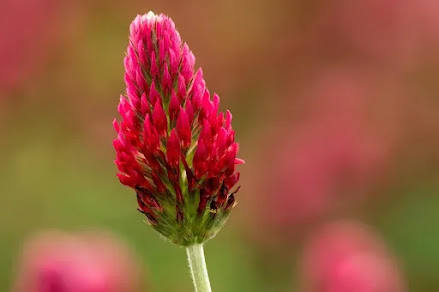Red clover is a plant that belongs to the legume family. It can be used in extract form or in capsules to improve cardiovascular health, reduce menopausal symptoms, help you to maintain strong bones, reduce skin inflammation that causes conditions like eczema and psoriasis, fight respiratory conditions, and lower your risk of certain cancers, such as prostate, endometrial and breast cancer.
 |
| Red Clover (Image : Internet) |
Introduction:
Red clover, scientifically known as Trifolium pratense, is a versatile herb that has been cherished for centuries for its potential health benefits and natural remedies. With its vibrant, reddish-pink flowers and trifoliate leaves, red clover is not just a pretty plant; it is a powerful herbal ally. In this article, we'll explore the world of red clover, from its historical uses to its modern applications in promoting health and vitality.
Red Clover: A Blossoming Herbal Wonder
Botanical Background: Red clover is a legume that is native to Europe, Western Asia, and Africa but is now cultivated worldwide. It is identified by its iconic, spherical clusters of pink to reddish flowers and distinctive trifoliate leaves.
Historical Uses:
Traditional Medicine: Red clover has a long history of use in traditional herbal medicine. Native American, European, and Asian cultures utilized it for various therapeutic purposes.
Women's Health: It was often used to support women's health, particularly during menopause and to address conditions like hot flashes and menstrual discomfort.
Modern Applications:
Isoflavones: Red clover contains isoflavones, such as genistein and daidzein, which are phytoestrogens that may offer benefits for women's health.
Bone Health: Isoflavones in red clover are believed to promote bone health and reduce the risk of osteoporosis.
Cardiovascular Health: Some research suggests that red clover may help support heart health by improving cholesterol levels and blood vessel function.
Skin Health: Red clover is used in skincare products for its potential to improve skin texture and reduce the signs of aging.
Respiratory Health: It has been employed as a remedy for coughs and respiratory discomfort, particularly in the form of red clover tea.
Preparation and Usage:
Red clover can be used in various forms:
Tea: Red clover tea is a common way to enjoy its potential health benefits. The dried flowers or leaves can be steeped to make a soothing infusion.
Supplements: Red clover supplements, available in various forms, provide a concentrated dose of isoflavones and other beneficial compounds.
Topical Products: Some skincare products incorporate red clover extract for its potential skin-soothing and rejuvenating properties.
Precautions:
While red clover is generally safe when used as directed, it's important to consult with a healthcare professional, especially if you are pregnant, nursing, or taking medications. Some individuals may experience mild side effects, and red clover may interact with certain medications.
Conclusion:
Red clover is a versatile herb that continues to be a source of herbal wisdom and potential health benefits. Whether you're sipping on a cup of red clover tea, exploring its potential in supplements, or incorporating it into your skincare routine, red clover invites you to embrace the natural marvels of this herb and let it be a source of vitality and well-being in your life.
Comments
Post a Comment